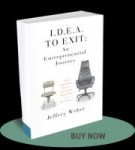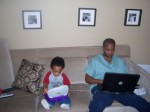Statistics show that entrepreneurs that have business plans succeed at a much higher rate than those that do not. But many times, entrepreneurs’ business plans are lacking, to say the very least. I asked for feedback about the biggest mistakes that entrepreneurs make when writing or revising a business plan. I personally would say that the first mistake is not writing one at all! See below for some of the other major mistakes- you will notice some of the advice is similar in nature and that is because those points are THAT IMPORTANT!
Also, I will be putting some of this very advice into practical reality as I review and dissect a real business plan on the text messaging industry live with Suzanne Caplan on WMNY Pittsburgh Business Radio on Tuesday April 20th. It streams live at www.wmnyradio.com at 4PM ET/ 3PM CT.

1. Cut That Top-Line In Half!
Startups consistently underestimate the intensity of competition & their burn rate. Top-line revenue projections are often overstated, with actuals well below budget for quite a while. With a construction services firm I worked with, aggressive budgeting created continuing cash problems as the business secured far too little capital for the startup phase. As a general rule of thumb, I tell clients in the startup phase to cut their revenue projection in half and use that as a best case.

2. Plans Are Guides, Not Rails
We work with entrepreneurs around the country; many come to us with great ideas but are afraid to act on it until they have the plan just right. The mistake these people make is that they perceive business plans as "tracks" and not "guides" to help direct activities.
If a plan is too rigid it is impossible to react as every change just brings you farther away from the track. As a guide, you can check the bearing and continue in the right direction but with flexibility to tweak as you go.

3. Ever Think About Making Money?
The NUMBER ONE mistake in business plans - not thinking about how they're going to make money. Most plans talk about "what we do", NOT how we will sell, to whom, how much we will charge and how much profit we will make.
You need to have a CLEAR understanding of what the "pain" you're solving is. This way your product/service is aimed at being the solution. Now you can figure out how much it costs you to provide the service and how much to charge. Then feel free to go ahead and make a profit!

4. Millionaires Hit Singles
I have seen thousands of business plans seek money for their indie films. The one thing they all have in common, which immediately classifies it as “junk”, is that they all believe they are the next "Blair Witch", "Juno" or "Avatar". Trust me on this one. Most of them have illusions of grandeur. The only way to become a millionaire is to go to bat, hit singles as much as you can, and when you fail to hit the ball, increase your practice time and prepare better for your next time at bat.

5. The Plight Of The Entrepreneur
One of the biggest danger signals in a business is being overly optimistic in their sales projections. When I asked a client of a company that was struggling for several years about their business plan and projections their response was alarming, "I simply calculated what was necessary to generate the profit that I wanted".
Never mind that this company did not do a market analysis or really ANY analysis for that matter but took a shot in the dark. Better to be more realistic...

6. No Hook + No Lure = No Fish
A business plan must “hook” the reader in the first 90 seconds or it won’t get read; if it doesn’t get read, it won’t lead to the desired action (e.g. funding or a business deal). Many business plans make the mistake of being too dry-- they read like the ingredient list on a cereal box. While details help build credibility, the business plan is also a sales document and must convey why the business is exciting and will change the world. In sum, a good business plan is a page-turner.

7. Be Brave & Shift Gears
The one thing I've learned from the businesses I've started is no matter how hard you work on your business plan, you must be flexible and willing to shift gears when necessary. It doesn't matter if you think you've correctly defined your niche as "x" if your customers are saying it's really "y". Don't be afraid to shift gears if necessary because change is good. Having an open mind and taking action quite often brings success to businesses.

8. Aiming With No Target
The biggest biz plan mistake, the one that gives birth to many other mistakes - failing to define the target market for the business. Without understanding who the potential customers are there is no way to develop the right marketing plan or address the competition. Entrepreneurs get so excited about their idea that they mistakenly believe "everyone" is a future customer. Trying to write a business plan that markets a product or service to the entire world is the same as marketing to no one.

9. Target*Customize*Differentiate
I believe the biggest business plan mistake made is using a template or standardizing. Relying heavily on a business plan template may equate to providing more or less information than recipient(s) need (target and customize). Template users may also fail to create a branded document, which differentiates their company or product.
Thanks to: Isha Edwards, Brand Mktg Consultant.

10. Pain Relievers Vs. Vitamins
When creating business plans and packaging your pitch, focus on selling pain relievers instead of trying to push vitamins. I've written over 70 plans to date - #1 challenge I face is helping entrepreneurs craft a pitch so it is crystal clear they are solving a 'hair-on-fire" type problem. Solve a massive pain point in the market with a critical immediate need in a substantial market. We all forget to take our vitamins, but if we have a headache, we look for pain relief as fast as possible.

11. Blissful Thinking
Entrepreneurs botch a business plan by making up numbers to fit their wishful thinking, or to match what they think funders want. If honesty would show a business is too small, they'll nudge a customer retention percentage here, or reduce an expense line there. They don't do it to deceive, but they can't quite face that their idea may not be the next billion-dollar idea, but only the next $100 million idea. They raise too much money and end up needing to provide impossible returns.

12. K.I.S.S.
Keep It SMART and Simple - Make sure your goals are Specific, Measurable, Attainable, Relevant and Time-bound and that your business plan isn't so complex that it becomes more work and takes more time to track your goals than the time you spend in the business itself.
Thanks to: Lori M. Coonen.

13. Plan For Higher Costs
Starting a business is full of unexpected events. Unfortunately these events usually cost more money. Even the most detailed planner will not be able to forecast these costs. Never budget strictly on the costs you have researched. It is easy to convince oneself that these numbers will all fit in comfortably with your business plan but it will be much more of a pain to deal with after the fact.

14. You're Never "Done"
The biggest “what not to do” that I can think of when it comes to your business plan is to create it because it is the "right thing to do" and then put it on your shelf and call it complete. A good business plan will grow and shift as your business develops. It should support your growth, guide your actions and serve as a compass for your goals. The day you are “done” with your business plan is the day you close your doors.

15. Business Plan Strategic Flaw
One of the biggest mistakes business planners make is spending more time and energy on spreadsheet modeling and tactical planning than on strategy. Strategy development is hard work and takes discipline to do well. Strategic positioning of the business creates a competitive advantage and attracts customers, makes business decisions easier and you will spend less money on tactics that will have more impact on creating customer demand. You leverage strategy for more revenue at lower cost.

16. Make The Right Assumptions
Assumptions in a Business Plan should explain 1) WHY sales reflect selling 2 units of service A + 5 units of product Z, & 2) WHAT actions will cause the sales, including costs. Maybe the company will have an ad in a local paper, or a booth in a trade show, or current clients gave referrals that will close in the month. By knowing what causes sales and expenses to occur, the owner can assess outcomes, and determine whether to continue that thinking when planning the future of the business.

17. Where's The Plan?
The biggest mistake with business plans is taking the time to make a plan, and then forgetting about it. Recently, an organization hired my company to bring a more strategic approach to their marketing. In our first meeting, I asked if they had a business plan. They did – locked away in a filing cabinet, and no one had the key. Business plans are the foundation for all company activity, and should be consistently evaluated and adjusted to ensure maximum effectiveness and ROI.

18. Too Big? Let Go!
Don't forget to plan how to grow and with whom.
Who doesn't write down - Earn 10 million in profit in the next five years - as part of their goals and plans? What we fail to do is take into consideration how many other people are needed to make "Really Big", happen. As an inventor, a creator, the boss, the one thing to remember is, as you grow, add people. Add people who compliment your strengths and then (drum roll) let them do the job.

19. Keep It Simple Stupid
The biggest mistake entrepreneurs make when writing a business plan is failing to keep it simple. They end up making the plan so complicated in an effort to impress investors and to seem more experienced, when in actuality, a business plan should be clear and simple. The quality of a plan is not measured by its length or ability to impress the reader; it's measured through its implementation. Therefore, a good business plan should be straightforward and actionable while also being thorough.

20. Too Aggressive -- Too Soon
The biggest mistake when writing a business plan is when entrepreneurs become too aggressive too soon.
While it's great to have lofty goals, overextending yourself too quickly will create burnout and risk failure.

21. Build A Flexible Plan
The biggest mistake that entrepreneurs make is once they have written the business plan, then they never look at it again. You created the business plan for a reason; this should be a working document that your business operates from on a daily basis, not another binder to sit on the shelf and collect dust. Build a business plan that is a flexible, workable for crafting your business vision. The key is to use it. Hold yourself to one hour a day, 5 days a weeks to work on your plan.

22. Stick To One Page
Don't try to plan every detail of every day in your business plan. Stick to key areas of focus (hiring, sales, systems, etc) and then create mini-plans each week as you go in those areas. If you go too deep, too fast you'll create a behemoth of a plan that 1) you won't use and 2) will limit your ability to react to opportunities that come up later in the year. If your plan doesn't fit on one sheet of paper, it is too detailed. With just one page, you are likely to look at and use it daily.

23. Feeling Without Sensing
Imagine you are writing your first business plan. You sit at the table feeling great about your idea and you are going to rule the world... surely the best setting?
Nothing could be further from the truth! Sure, be confident, even a little 'big headed' but always make sure you introduce an element of realism to the plan, your future as an entrepreneur depends on it.
Make sure you always have it checked by someone who isn't emotionally attached.

24. Sell Or Else...
My biggest business plan mistake was not to have a detailed marketing plan. Once I started my business, I operated almost on the "I hope they'll show up" principle and did minimal marketing. This strategy brought me to the verge of bankruptcy. It took time and some support from experienced businessmen to "grow up" and create a solid marketing plan that finally resulted in consistent sales and repeat customers.

25. The Pricing Dilemma
Incorporate a tiered approach to your pricing (2-3). Calculate and project your Year 1 success based on the lower price. This will help prevent a financial strain early on. In order to determine your pricing strategy, take the time to evaluate your target customer. When identified, do additional research about your competitors for that target to get a pricing benchmark. Don't price lower than your competition - this creates the negative perception of your company not being a qualified supplier.

26. Always Raise More Money
Skimp on overhead, not on funding. Business plans never ask for enough money up front and then find themselves in a world of pain when reality sinks in.
The early stages of a business are about survival and rarely make anyone rich. Make sure your business can survive through several worst case scenarios - I wouldn't invest in a business that couldn't.

27. Overstating Expected Revenue
Every business plan I have ever read has overstated expected revenue (sometimes wildly), and understated ramp-up time to sales and ancillary expenses. The world is a far different place when you later take off the rose-colored glasses that you - and everyone - wore when writing your business plan! But to be fair, even a seasoned entrepreneur only has so much knowledge - the rest is a calculated risk. With that in mind, perhaps we should adopt the term: Business "Scenario", rather than "Plan"!

28. Building Down From Revenue
Instead of starting with desired cash flow and profits and building up to expected revenue, you start with your sales revenues and volumes and work down to net income. This mistake can lead you to overstate your sales and show unreasonable profits early in your company's life. You want to start with desired cash flow and profits, build to the revenue you would need to meet those goals, and determine whether that amount of revenue is reasonable.

29. Optimistic Pro Forma
Basing a business plan on an overly aggressive and optimistic pro forma is a big mistake. Hockey stick growth is not likely for most and being more pessimistic in establishing your budget is best for forecasting cash flow and in setting investors' expectations. You can always come out pleasantly surprised and ahead of budget if you plan for the worst.

30. Road Test Your Team
You don't know what mistakes are in your plan. I didn't. So before you launch, bring all the players of your team together. Let them hash things out for you while you sit back and listen. Bring in your attorney, accountant, insurance actuary or whoever else you have chosen to collaborate with. Have them review and critique your plan and render their own opinions. The mistakes you missed are likely to get caught during this process.
I hope that you can make use of this advice when you do your next plan. Many thanks to everyone who contributed!





























